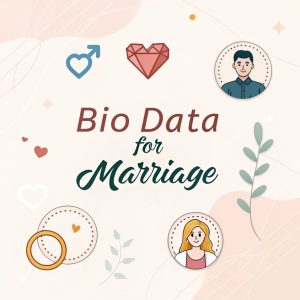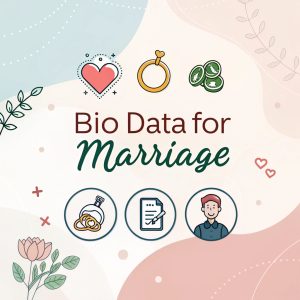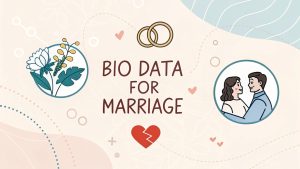Bio Data for Marriage: A Complete Guide
Creating a bio data for marriage is one of the first steps when looking for a potential life partner. It’s not just a document—it’s your first impression. In many cultures, especially across South Asia, a well-written marriage bio data can help families make early decisions about compatibility. It serves as a concise introduction that highlights your background, lifestyle, education, and family details.
Think of it as your personalized resume for marriage purposes, reflecting not only your personal attributes but also values and expectations. A good bio data can create curiosity and interest, and sometimes even a strong emotional connection at the first glance.
With marriage still being a family-involved decision in many cultures, presenting clear, respectful, and truthful information can truly make a difference. Whether you’re sharing it with matchmakers or through matrimonial sites, having a polished and detailed bio data is a modern necessity rooted in tradition.
What is Bio Data for Marriage?

A marriage bio data is a formal document that outlines your key personal, professional, and family information intended for matrimonial purposes. It acts like a matchmaking portfolio, summarizing who you are in a structured format. Unlike a job resume, it includes deeply personal aspects like religion, caste, horoscope, and even expectations from a partner.
This document is often shared among families or through matrimonial websites to initiate discussions about arranged marriage. It typically includes your name, age, height, education, profession, family details, and sometimes even a photograph.
Marriage bio data bridges the gap between strangers looking for a lifelong bond. It simplifies the search by offering a snapshot of compatibility, lifestyle, and values. In arranged settings, it gives potential matches a respectful and informative starting point before meeting in person. By showcasing the right mix of facts and personality, a marriage bio data can set the stage for meaningful conversations—and possibly, a lifelong relationship.
Importance of Bio Data in Matrimonial Searches
The role of a bio data in marriage cannot be overstated—it’s the foundation of most arranged matrimonial decisions. In a world where first impressions count, this document is often the very first introduction a prospective match receives. It acts as a screening tool, helping both individuals and families assess suitability based on lifestyle, education, values, and family background.
Bio data helps narrow down choices efficiently. In cultures where family input is crucial, this document provides all the information elders may want to consider. It avoids awkward or time-consuming conversations by stating everything clearly upfront—whether it’s religious beliefs, career ambitions, or marriage preferences.
In online platforms, a complete and well-written bio data increases visibility and match success. It speaks volumes about a person’s seriousness and clarity about marriage. Ultimately, it helps build trust and starts conversations that are rooted in transparency, saving time and effort for everyone involved.
Basic Information to Include in Marriage Bio Data
A complete marriage bio data should begin with all the basic personal details. These foundational facts give a clear overview of your identity and help others understand your lifestyle at a glance. The essential fields to include are:
- Full Name
- Date of Birth and Age
- Height and Weight
- Gender
- Religion and Caste
- Mother Tongue
- Marital Status
- Nationality
- Current Address and Contact Information
You may also want to mention your horoscope or zodiac sign if it’s relevant to your culture or matchmaking expectations. These details provide a structured overview and help matchmakers or families filter based on preferences.
Always make sure the basic information is accurate and up-to-date. A mismatch here could lead to unnecessary confusion. Think of this as the foundation of your matrimonial profile—clear, concise, and straightforward, paving the way for deeper conversation.
Personal Details Section of Marriage Bio Data
The personal details section goes beyond statistics—it captures your essence, lifestyle, and beliefs. Here, you introduce yourself as a human being, not just a list of checkboxes. Start with a brief self-description: your personality, hobbies, strengths, and what you’re passionate about.
Mention key interests like:
- Hobbies (e.g., music, travel, sports)
- Languages spoken
- Personality traits (e.g., calm, adventurous, spiritual)
- Lifestyle choices (vegetarian/non-vegetarian, teetotaler, smoker/non-smoker)
You can also touch on your daily routine, social habits, or aspirations in life. This section provides an emotional connection and makes your bio data more relatable and memorable.
Being honest here is key. It sets realistic expectations and builds trust early in the process. A well-written personal section can help your profile stand out and reflect the kind of partner you’re likely to be in a long-term relationship.
Family Background in Marriage Bio Data

Your family background is one of the most important sections in a marriage bio data. It helps potential matches and their families understand your upbringing, values, and social circle. It’s less about wealth or prestige and more about compatibility and shared traditions.
Here’s what you should include:
- Father’s name and profession
- Mother’s name and profession
- Siblings’ details (names, ages, professions, marital status)
- Family values (traditional, modern, spiritual, etc.)
- Cultural background or native place
If applicable, you can mention whether your family is joint or nuclear, and highlight any unique traditions you follow. It’s also helpful to mention your family’s educational and professional achievements in a respectful tone.
This section fosters a sense of openness and helps families judge not just the individual but the environment they come from, which plays a big role in long-term marital success.
Educational Qualifications for Marriage Bio Data
Education is a crucial part of a marriage bio data. It reflects your intellect, discipline, and often, your career direction. Start by listing your highest qualifications first and move downward. Mention the degree name, institution, year of graduation, and any notable achievements.
Here’s an example structure:
- Master of Business Administration, IIM Ahmedabad, 2021
- B.Tech in Computer Science, Delhi University, 2019
- Schooling from XYZ High School, Mumbai
If you’ve pursued any certifications, language courses, or professional training, include those too. This section also gives space to subtly reflect your career goals and passions. For instance, if you’re pursuing higher education abroad, or planning to switch industries, that information is helpful.
Being precise and honest is essential. Don’t overstate qualifications—accuracy builds trust. Whether you’re highly educated or skilled in a trade, this section helps paint a full picture of your capabilities and ambitions.
Professional Information to Include in Bio Data
The professional section of your marriage bio data outlines your current occupation, job role, and future career plans. It reflects your stability, ambition, and lifestyle, making it one of the most critical parts. Start by clearly stating your current job title, organization name, and location. Mention your industry, years of experience, and any career achievements or promotions you’re proud of.
Here’s a good format:
- Designation: Software Engineer
- Company: TCS, Bangalore
- Experience: 4 years
- Salary: ₹10 LPA (optional)
You may also want to include future plans like relocation, study plans, or entrepreneurial goals, especially if they might affect married life. Mention if your job requires frequent travel or remote work, as these can influence compatibility.
A transparent career section builds confidence in your profile. It shows your dedication, your ability to provide, and how you see yourself growing—both personally and professionally.
Lifestyle and Hobbies in Marriage Bio Data
The lifestyle and hobbies section reveals who you are beyond your education and career. It gives your future partner a glimpse of how you spend your free time and what kind of rhythm your daily life follows. Start by describing your general lifestyle—whether it’s active, laid-back, health-conscious, or fast-paced.
Common elements include:
- Diet: Vegetarian/Non-Vegetarian/Eggetarian
- Smoking/Drinking habits
- Fitness routines or sports
- Travel interests
- Reading, cooking, painting, or music preferences
Mentioning your passions or regular routines creates a sense of relatability. Whether you’re a morning jogger, a Netflix binge-watcher, or a weekend traveler, these traits speak volumes about your personality.
This section doesn’t need to be overly detailed, but should strike a balance between being informative and warm. A compatible lifestyle is key to a happy marriage, so it’s best to be honest and expressive here.
Religious Beliefs and Values in Marriage Bio Data
Your religious views and personal values can be deeply important in long-term compatibility, especially if your family places emphasis on faith and tradition. This section should respectfully outline your religious practices, level of observance, and overall spiritual outlook.
Here’s what you may want to include:
- Religion and sect/sub-sect
- Level of religious involvement (e.g., practicing, spiritual but not religious)
- Cultural rituals you follow (fasts, festivals, prayers)
- Openness to interfaith marriage (if applicable)
You can also discuss your moral values—honesty, empathy, independence, or family loyalty—and how they shape your worldview. These details help set expectations and show that you’re serious about building a future on shared beliefs and respect.
This section doesn’t need to be preachy—just honest. It allows you and the potential partner to explore if your values align, laying the foundation for a respectful, understanding relationship.

Expectations and Preferences Section of Marriage Bio Data
This section of the marriage bio data outlines what you’re looking for in a life partner. It allows you to gently express your dealbreakers, preferences, and marriage expectations. While you should stay respectful and flexible, this part is important for ensuring that both sides are on the same page.
Mention areas such as:
- Age range and height preferences
- Education and professional background
- Cultural or religious alignment
- Location preference (e.g., open to abroad relocation)
- Lifestyle compatibility (fitness, diet, family setup)
You may also state if you prefer someone with certain family values, or if you’re open to someone from a different background. Be honest without sounding overly demanding. It’s about finding someone who resonates with your ideals, not just ticking boxes.
Writing this section thoughtfully helps attract serious and suitable matches while avoiding unnecessary misunderstandings. It shows maturity and clarity in what you’re looking for in a partner.
Frequently Asked Questions About Bio Data for Marriage
Q: Is there a specific format for marriage bio data?
A: No fixed format, but most include sections like personal info, family background, education, career, and partner expectations.
Q: Should I include a photograph in my bio data?
A: Yes, a clear and recent photo adds authenticity and appeal to your profile.
Q: Can I write my bio data in English?
A: Absolutely! English is commonly used and makes it easier for diverse families to understand.
Q: How long should a bio data be?
A: Ideally, 1 to 2 pages, concise and detailed enough to create interest without being overwhelming.
Q: What if I don’t follow traditional customs?
A: It’s best to be honest. Mention your beliefs respectfully to attract like-minded individuals.
Conclusion on Bio Data for Marriage
A well-crafted bio data for marriage is more than just a document—it’s your first introduction to a possible life partner. It blends tradition and personality, offering a clear picture of your background, lifestyle, values, and aspirations. Whether you’re sharing it with relatives or posting it on matrimonial platforms, every section should reflect your true self—professionally written, thoughtfully arranged, and sincerely presented.
From personal details to professional achievements and partner expectations, each element plays a role in shaping how others perceive you. Clarity, honesty, and a touch of individuality can turn a simple bio data into a compelling invitation for someone to connect with you for life.
At the end of the day, it’s about finding someone who understands and accepts you. And that journey starts with a profile that speaks from the heart.